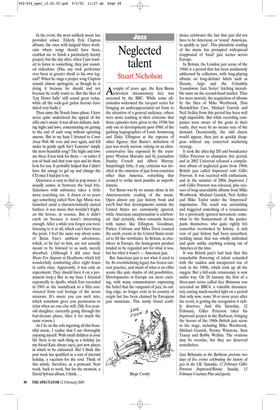Neglected talent
Stuart Nicholson
Acouple of years ago, the Ken Burns television documentary Jazz was screened by the BBC. While some aficionados welcomed the ten-part series for bringing an underappreciated art form to the attention of a general audience, others were more scathing in their criticism: that three episodes were given to the 1930s but only one to developments post-1960; of the gushing hagiographies of Louis Armstrong and Duke Ellington at the expense of other figures; that Burns’s definition of jazz was overly narrow, relying on an ultraconservative line espoused by the trumpeter Wynton Marsalis and by journalists Stanley Crouch and Albert Murray. Surprisingly little, if any, criticism was levelled at the omission of jazz from countries other than America, something that seemed to strike most pundits as unproblematic.
Yet Burns was by no means alone in his Americocentric reading of the music. Open almost any jazz history book and you’ll find that developments outside the United States are customarily ignored, while American exceptionalism is celebrated. And certainly, when romantic heroes with names like Ellington, Goodman, Parker, Coltrane and Miles Davis roamed the earth, events in the United States tended to fill the viewfinder. In Britain, as elsewhere in Europe, the homegrown product tended to be regarded not for what it was, but for what it wasn’t — American jazz.
But American jazz is not what it used to be. Its overwhelming legacy has frozen current practice, and much of what is on offer seems like pale shades of old possibilities. Developments in Europe are more exciting, with many commentators expressing the belief that the vanguard of jazz, its cutting edge, no longer rests in its country of origin but has been claimed by European jazz musicians. This newly found confi dence celebrates the fact that jazz did not have to be American, or ‘sound’ American, to qualify as ‘jazz’. This pluralistic reading of the music has prompted widespread reappraisal of ‘local’ jazz scenes across Europe.
In Britain, the London jazz scene of the 1960s is a period that has been assiduously addressed by collectors, with long-playing albums on long-defunct labels such as Deram, Argo and the Columbia ‘Lansdowne Jazz Series’ fetching incredible sums on the second-hand market. Thus for mere mortals, the acquisition of albums by the likes of Mike Westbrook, Don Rendell/Ian Carr, Michael Garrick and Neil Ardley from this period has been well nigh impossible. But while recording companies were aware of the gems in their vaults, they were by no means sure of the demand. Occasionally, the odd classic would appear, then just as quickly disappear without any concerted marketing strategy.
It took the ultra-hip DJ and broadcaster Gilles Peterson to champion this period, and in 2002 Universal released a compilation album of neglected gems from 1960s British jazz called Impressed with Gilles Peterson. It was received with enthusiasm, and in the summer of 2004, Impressed 2 with Gilles Peterson was released, plus reissues of long-unavailable albums from Mike Westbrook, Michael Garrick, Neil Ardley and Mike Taylor under the ‘Impressed’ imprimatur. The result was astonishing and triggered something of a renaissance for a previously ignored movement, somewhat to the bemusement of the participants themselves, who quite rightly felt somewhat overlooked by history. A rich vein of jazz history had been unearthed, yielding music that was wholly individual and quite unlike anything coming out of America at the time.
It was British jazz’s bad luck that this remarkable flowering of talent coincided with the sudden and unexpected rise of rock in the 1960s, which took up all the oxygen. But a full-scale renaissance is now under way. On 28 January the first of a three-part series called Jazz Britannia was screened on BBC4, a valuable documentary casting much-needed light on a period that only now, some 30 or more years after the event, is getting the recognition it richly deserves. And this Saturday, 12 February, Gilles Peterson takes his Impressed project to the Barbican, bringing the heroes of the 1960s British jazz scene to the stage, including Mike Westbrook, Michael Garrick, Norma Winstone, Stan Tracey and Bobby Wellins. The ovations may be overdue, but they are deserved nonetheless.













































 Previous page
Previous page